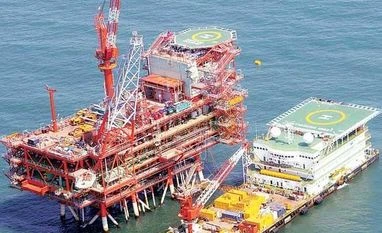Thirteen years after it first undertook a price discovery exercise for natural gas, Reliance Industries, along with UK partner BP, will be selling 5 mscmd (million standard cubic metres a day) from its R-cluster field in the Krishna-Godavari (KG) basin through an e-auction mechanism.
This discovered price would, however, be capped by a ceiling set by the government every six months for gas produced from difficult fields.
The base price would be 9 per cent of the average Brent price for three months preceding the delivery date. “We chose this base price because imported LNG (liquefied natural gas) from Qatar is benchmarked to 12.53 per cent of the Brent average plus 60 cents, which roughly translates into 13.5 per cent at the current rate,” said an RIL executive. He said the company was looking to maximise value for itself and the government through the process.
The bidding is likely on October 11. CRISIL Risk and Infrastructure Solutions has been appointed manager for the auction, to be conducted on the platform of ProcureTiger, a brand of Gujarat-based E-procurement Technologies.
RIL will sign gas sales purchase agreements (GSPAs) with the buyers, assuring them a minimum quantity. "If we are not able to meet that volume from R-Cluster, we will make an alternative arrangement," said the executive. The R-Cluster field in the KG-D6 block is expected to commence production in the first half of 2020.
The draft GSPA has proposed a ship or pay clause for 80 per cent of the volume, as against the industry benchmark of 90 per cent. Both buyer and seller are required to lift and supply 80 per cent of the contracted gas, failing which they will have to pay for that volume.
Bidders would be able to see the price emerging during the e-auction and the lowest bidder can better his offer by at least 0.1 per cent (ticker rate) of the Brent price. Others can then bid an even higher price.
This process will go on till no one wants to increase the price.
The bidding will be based on price, tenure, and volume. Bidders can choose the tenure of two to three years. The minimum quantity for which a bid can be placed is 0.05 mscmd.
The bidding process is initially planned to run for three hours. The dynamic nature of auction could see bidders changing their parameters, in which case the auction will be extended by half an hour
The timeline will be extended if there is change in volume allocation, based on a bid received in the last 10 minutes before closure time. In the event of a price tie, the one offering longer tenure will get the volume. If price and tenure are the same, the bidders will be given allocations in the ratio of the quantities they have bid.
RIL has conveyed to the bidders that it will make gas available to them between April 1, 2020, and March 31, 2021. Buyers will also have to notify when they will be taking the delivery. The gas will be transported through the East-West Pipeline owned by Pipeline Infrastructure.
Unlock 30+ premium stories daily hand-picked by our editors, across devices on browser and app.
Pick your 5 favourite companies, get a daily email with all news updates on them.
Full access to our intuitive epaper - clip, save, share articles from any device; newspaper archives from 2006.
Preferential invites to Business Standard events.
Curated newsletters on markets, personal finance, policy & politics, start-ups, technology, and more.
)